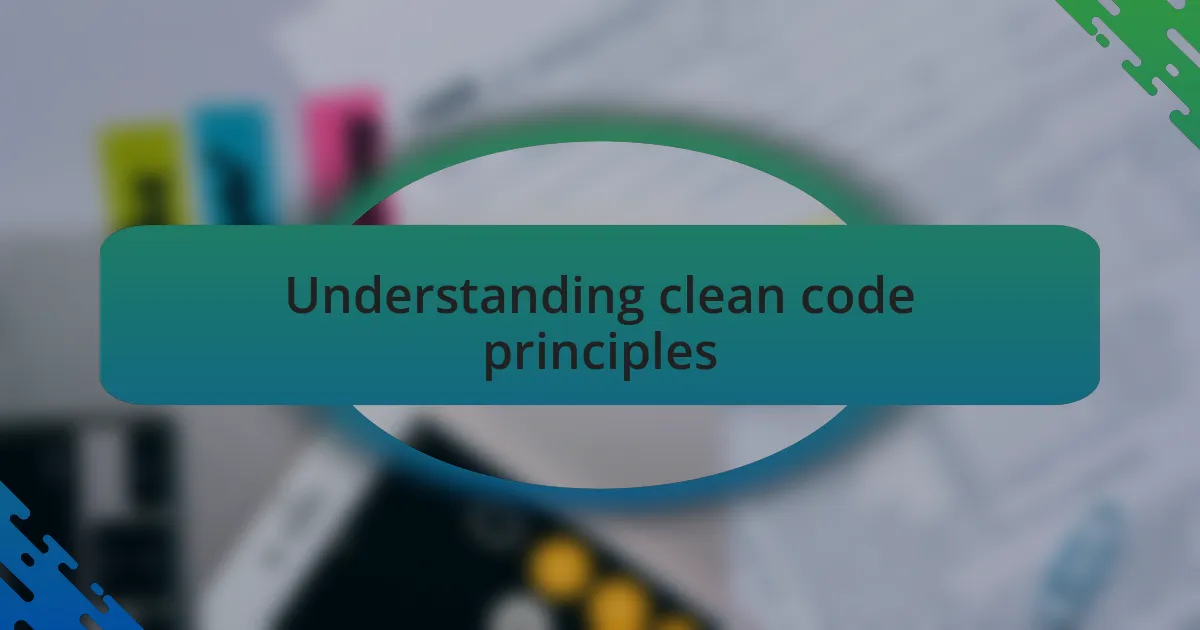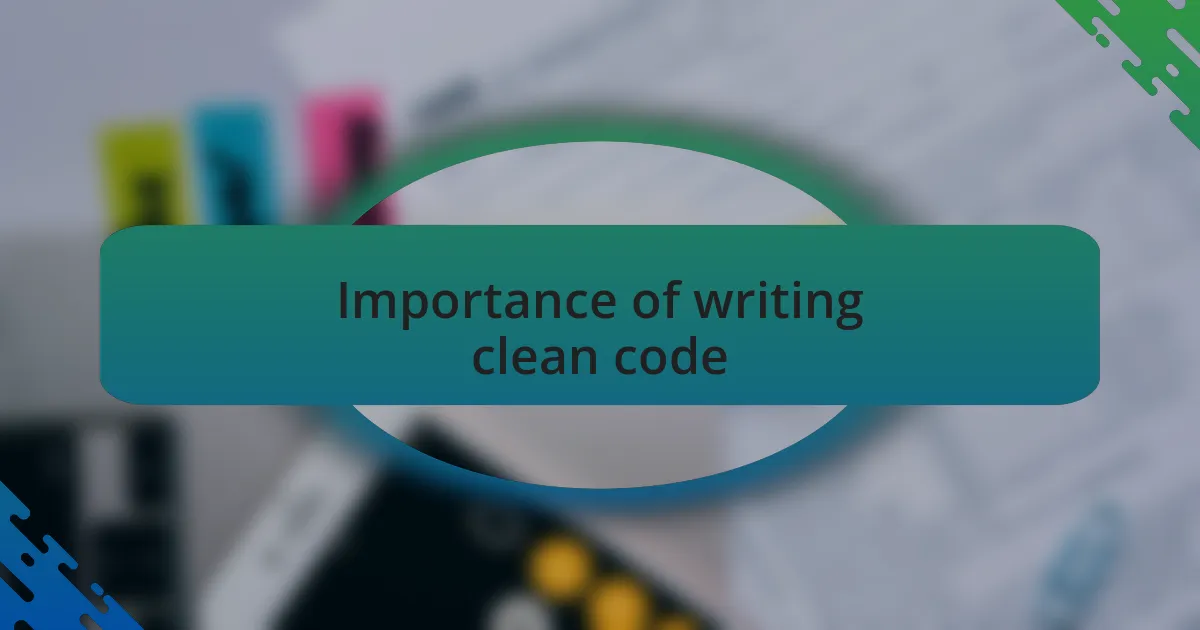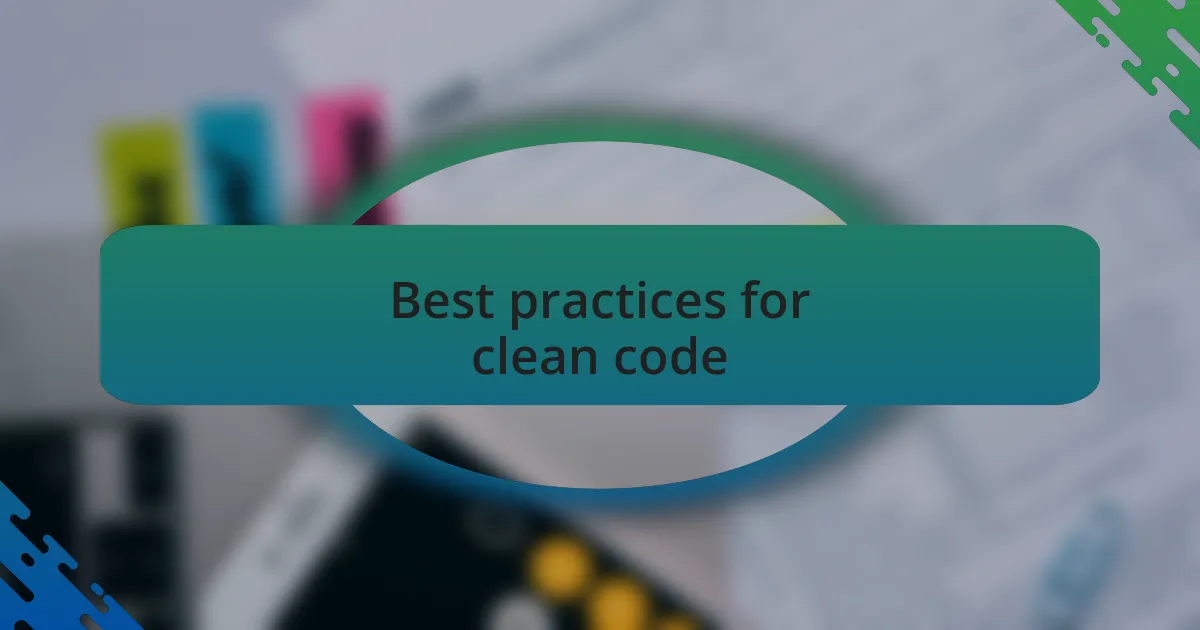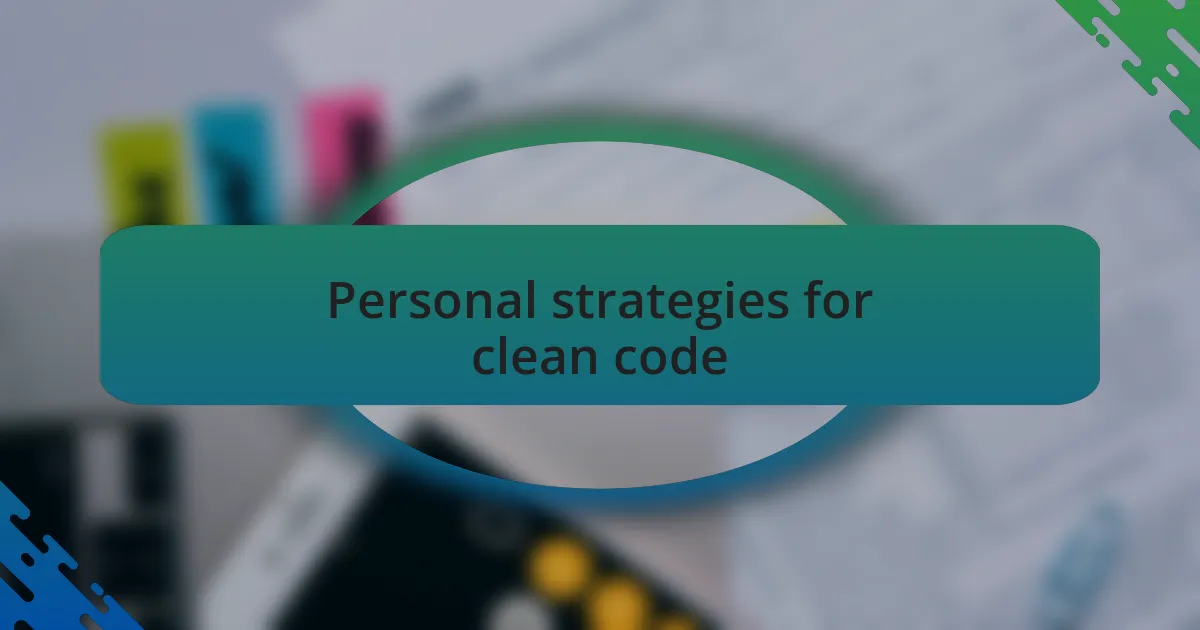Key takeaways:
- Emphasizing meaningful naming conventions and small, focused functions enhances code readability and maintainability.
- Adopting clean code practices fosters better collaboration, reduces bugs, and ensures long-term project viability.
- Regular code reviews and thoughtful commenting significantly improve understanding and effectiveness in coding.
- Common pitfalls include neglecting exception handling and improper use of static members, which hinder code flexibility and clarity.

Understanding clean code principles
Clean code principles focus on readability, maintainability, and simplicity. I remember my early days as a coder, grappling with complex functions that were challenging to decipher. Have you ever felt lost while trying to understand someone else’s code? Adopting clean code practices helped me significantly reduce that confusion, paving the way for smoother collaboration.
One key aspect of clean code is meaningful naming conventions. I can’t stress enough how a well-named variable can illuminate the intent behind the code. For instance, using maxSpeed instead of a generic x instantly conveys purpose. Consider how your variable names tell a story; are they engaging enough to capture a reader’s attention?
Another principle is to keep functions small and focused. I once worked on a project where a single function ballooned into over a hundred lines. It became a nightmare to maintain. Breaking that function into smaller, self-contained pieces made it not only cleaner but also more efficient. What’s your approach when tackling large chunks of code? Embracing clean code principles can transform that daunting task into manageable parts.

Importance of writing clean code
Writing clean code is essential because it greatly enhances collaboration among developers. I remember one particular project where I joined a team and had to dive into a codebase that was a maze of convoluted logic. It felt like I was trying to solve a puzzle with missing pieces. When everyone adopts clean coding standards, it fosters an environment where sharing and understanding each other’s work becomes seamless, reducing misunderstandings and errors.
Additionally, clean code reduces the chances of bugs sneaking into your project. I once spent hours debugging a problematic section of code, only to find that a lack of clarity had caused the issue. The longer I stared at the jumbled lines, the more frustrated I became. If the code had been clearer, identifying the problem would have been much quicker. Have you faced similar situations where chaotic code turned into a labyrinth of bugs? By adhering to clean code practices, you can create a more stable and reliable codebase from the start.
Finally, maintaining clean code has long-term benefits. I’ve seen projects become stagnant when messy code leads to bottlenecks in updates and changes. As a developer, it’s crucial to think about the future of your code rather than just the current functionality. How often do you think about maintainability when writing your code? Keeping this in mind can save countless hours of headaches down the road as your projects grow and evolve.

Best practices for clean code
When it comes to clean code, consistent naming conventions are a must. I’ve encountered countless instances where cryptic variable names left me scratching my head, trying to decipher their purpose. I remember working on a project where a function named “doStuff” could have meant anything—it was a nightmare. Choose descriptive and meaningful names; they clarify your intent and make your code more navigable. How often have you wished for a naming system that speaks to you rather than puzzles you?
Another best practice is to write short, focused functions. I’ve often felt the weight of enormous functions that try to do everything at once, making them nearly impossible to read. A couple of years back, I had a function that was over 100 lines long. Refactoring it into smaller, single-responsibility functions not only made the code neater but also enhanced my understanding of its logic. Have you ever experienced the relief that comes from breaking down complexity?
Lastly, regularly reviewing and refactoring your code is crucial. I learned this the hard way when I left a piece of code untouched for too long, only to realize later that it no longer aligned with newer project requirements. Regular refactoring not only keeps your code clean but fosters an evolving understanding of it. Are you guilty of postponing this critical step? Embrace it, and you’ll find that it keeps your projects agile and vibrant.

Techniques for C# clean code
One technique I find particularly helpful is to limit the number of parameters in functions. Early in my career, I created a function with an overwhelming ten parameters, and honestly, it felt like I was juggling knives. I quickly learned that reducing parameters not only simplifies the function but also improves readability. How often do you find yourself confused while tracing the flow of data through functions with too many inputs?
Another key to clean code in C# is employing comments effectively. I remember a time when I glossed over commenting, thinking my code would speak for itself. But later, during a team review, several of my colleagues struggled to understand my logic. Thoughtful comments can bridge that gap, providing context that resonates with anyone who comes across your code in the future. Have you ever found clarity in a coworker’s comments that made a complex piece of code seem almost simple?
Lastly, adopting consistent formatting—like indentation and spacing—is vital. I remember when inconsistent formatting created a rift among team members, making collaboration frustrating. Taking the time to standardize formats not only promotes teamwork but also creates a visually pleasing structure that draws you back to the code with eagerness rather than dread. Can you recall a moment when clean formatting made navigating someone else’s code a breeze?

Common pitfalls in C# coding
One common pitfall I’ve encountered in C# coding is neglecting exception handling. Early on, I wrote code that assumed everything would go perfectly, only to be hit with a runtime error when an unexpected value popped up. It was a harsh lesson that taught me the importance of anticipating errors and incorporating try-catch blocks. Have you ever faced a situation where a lack of error handling turned a simple task into a nightmare?
Another mistake I’ve seen developers make is excessive use of static members and methods. When I first started coding, I leaned heavily on static constructs, believing they would simplify my design. However, I soon realized this approach made my code less flexible and harder to test. Have you ever noticed how relying too much on static can lead to tightly coupled code that’s a pain to work with?
Lastly, forgetting to implement proper naming conventions can create significant confusion. I once had a colleague whose variable names were so cryptic that deciphering them felt like cracking a code. Clear and descriptive names not only clarify the purpose of variables and functions but also enhance teamwork by ensuring everyone is on the same page. Have you ever spent extra time trying to understand a poorly named variable, only to wish it had been labeled more intuitively?

Personal strategies for clean code
When it comes to writing clean code, one of my personal strategies is to embrace simplicity. I vividly remember a project where I overcomplicated a function, trying to pack in every feature I thought was necessary. The result was a tangled mess that took hours to debug. I learned that the best solutions are often the simplest; clarity should always triumph over complexity in my code. Have you experienced a similar moment of realizing less is more?
Another important aspect of my approach is regular code reviews. In my early development days, I was hesitant to share my code out of fear of criticism. However, opening my work to peer feedback transformed my coding habits. It’s amazing how a fresh pair of eyes can spot potential issues and provide insights, turning weaknesses into strengths. Have you ever found that collaborating with others led to better solutions than you could’ve achieved alone?
Lastly, I prioritize writing thorough comments and documentation. I once dove into a legacy codebase where the absence of documentation made understanding the code nearly impossible. That experience reinforced for me that comments are a lifesaver—not just for others but for my future self as well. They bridge the gap between the code and the reader, enhancing understanding, especially when you revisit your work after a long absence. Have you ever benefited from comments that brought clarity to complex code?